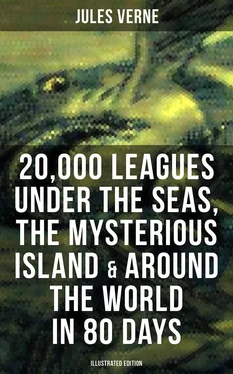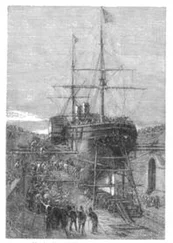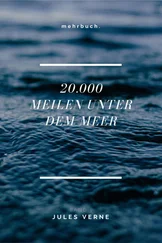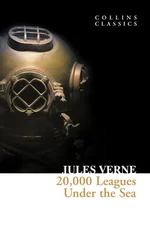“And you’ll try to get away by swimming?”
“Yes, if we’re close enough to shore and the ship’s afloat on the surface. No, if we’re well out and the ship’s navigating under the waters.”
“And in that event?”
“In that event I’ll try to get hold of the skiff. I know how to handle it. We’ll stick ourselves inside, undo the bolts, and rise to the surface, without the helmsman in the bow seeing a thing.”
“Fine, Ned. Stay on the lookout for such an opportunity, but don’t forget, one slipup will finish us.”
“I won’t forget, sir.”
“And now, Ned, would you like to know my overall thinking on your plan?”
“Gladly, Professor Aronnax.”
“Well then, I think—and I don’t mean ‘I hope’—that your promising opportunity won’t ever arise.”
“Why not?”
“Because Captain Nemo recognizes that we haven’t given up all hope of recovering our freedom, and he’ll keep on his guard, above all in seas within sight of the coasts of Europe.”
“I’m of master’s opinion,” Conseil said.
“We’ll soon see,” Ned Land replied, shaking his head with a determined expression.
“And now, Ned Land,” I added, “let’s leave it at that. Not another word on any of this. The day you’re ready, alert us and we’re with you. I turn it all over to you.”
That’s how we ended this conversation, which later was to have such serious consequences. At first, I must say, events seemed to confirm my forecasts, much to the Canadian’s despair. Did Captain Nemo view us with distrust in these heavily traveled seas, or did he simply want to hide from the sight of those ships of every nation that plowed the Mediterranean? I have no idea, but usually he stayed in midwater and well out from any coast. Either the Nautilus surfaced only enough to let its pilothouse emerge, or it slipped away to the lower depths, although, between the Greek Islands and Asia Minor, we didn’t find bottom even at 2,000 meters down.
Accordingly, I became aware of the isle of Karpathos, one of the Sporades Islands, only when Captain Nemo placed his finger over a spot on the world map and quoted me this verse from Virgil:
Est in Carpathio Neptuni gurgite vates
Caeruleus Proteus …*
*Latin: “There in King Neptune’s domain by Karpathos, his spokesman / is azure-hued Proteus … ” Ed.
It was indeed that bygone abode of Proteus, the old shepherd of King Neptune’s flocks: an island located between Rhodes and Crete, which Greeks now call Karpathos, Italians Scarpanto. Through the lounge window I could see only its granite bedrock.
The next day, February 14, I decided to spend a few hours studying the fish of this island group; but for whatever reason, the panels remained hermetically sealed. After determining the Nautilus’s heading, I noted that it was proceeding toward the ancient island of Crete, also called Candia. At the time I had shipped aboard the Abraham Lincoln, this whole island was in rebellion against its tyrannical rulers, the Ottoman Empire of Turkey. But since then I had absolutely no idea what happened to this revolution, and Captain Nemo, deprived of all contact with the shore, was hardly the man to keep me informed.
So I didn’t allude to this event when, that evening, I chanced to be alone with the captain in the lounge. Besides, he seemed silent and preoccupied. Then, contrary to custom, he ordered that both panels in the lounge be opened, and going from the one to the other, he carefully observed the watery mass. For what purpose? I hadn’t a guess, and for my part, I spent my time studying the fish that passed before my eyes.
Among others I noted that sand goby mentioned by Aristotle and commonly known by the name sea loach, which is encountered exclusively in the salty waters next to the Nile Delta. Near them some semiphosphorescent red porgy rolled by, a variety of gilthead that the Egyptians ranked among their sacred animals, lauding them in religious ceremonies when their arrival in the river’s waters announced the fertile flood season. I also noticed some wrasse known as the tapiro, three decimeters long, bony fish with transparent scales whose bluish gray color is mixed with red spots; they’re enthusiastic eaters of marine vegetables, which gives them an exquisite flavor; hence these tapiro were much in demand by the epicures of ancient Rome, and their entrails were dressed with brains of peacock, tongue of flamingo, and testes of moray to make that divine platter that so enraptured the Roman emperor Vitellius.
Another resident of these seas caught my attention and revived all my memories of antiquity. This was the remora, which travels attached to the bellies of sharks; as the ancients tell it, when these little fish cling to the undersides of a ship, they can bring it to a halt, and by so impeding
Mark Antony’s vessel during the Battle of Actium, one of them facilitated the victory of Augustus Caesar. From such slender threads hang the destinies of nations! I also observed some wonderful snappers belonging to the order Lutianida, sacred fish for the Greeks, who claimed they could drive off sea monsters from the waters they frequent; their Greek name anthias means “flower,” and they live up to it in the play of their colors and in those fleeting reflections that turn their dorsal fins into watered silk; their hues are confined to a gamut of reds, from the pallor of pink to the glow of ruby. I couldn’t take my eyes off these marine wonders, when I was suddenly jolted by an unexpected apparition.
In the midst of the waters, a man appeared, a diver carrying a little leather bag at his belt. It was no corpse lost in the waves. It was a living man, swimming vigorously, sometimes disappearing to breathe at the surface, then instantly diving again.
I turned to Captain Nemo, and in an agitated voice:
“A man! A castaway!” I exclaimed. “We must rescue him at all cost!”
The captain didn’t reply but went to lean against the window.
The man drew near, and gluing his face to the panel, he stared at us.
To my deep astonishment, Captain Nemo gave him a signal. The diver answered with his hand, immediately swam up to the surface of the sea, and didn’t reappear.
“Don’t be alarmed,” the captain told me. “That’s Nicolas from Cape Matapan, nicknamed ‘Il Pesce.’* He’s well known throughout the Cyclades Islands. A bold diver! Water is his true element, and he lives in the sea more than on shore, going constantly from one island to another, even to Crete.”
*Italian: “The Fish.” Ed.
“You know him, captain?”
“Why not, Professor Aronnax?”
This said, Captain Nemo went to a cabinet standing near the lounge’s left panel. Next to this cabinet I saw a chest bound with hoops of iron, its lid bearing a copper plaque that displayed the Nautilus’s monogram with its motto Mobilis in Mobili.
Just then, ignoring my presence, the captain opened this cabinet, a sort of safe that contained a large number of ingots.
They were gold ingots. And they represented an enormous sum of money. Where had this precious metal come from? How had the captain amassed this gold, and what was he about to do with it?
I didn’t pronounce a word. I gaped. Captain Nemo took out the ingots one by one and arranged them methodically inside the chest, filling it to the top. At which point I estimate that it held more than 1,000 kilograms of gold, in other words, close to 5,000,000 francs.
After securely fastening the chest, Captain Nemo wrote an address on its lid in characters that must have been modern Greek.
This done, the captain pressed a button whose wiring was in communication with the crew’s quarters. Four men appeared and, not without difficulty, pushed the chest out of the lounge. Then I heard them hoist it up the iron companionway by means of pulleys.
Читать дальше












